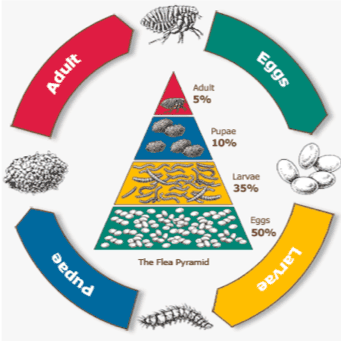Flea Meds, why are they not working!?!?
By Dr. Nichole M Brooks, DVM
Fish are not the only things biting this summer! Fleas are out there and plaguing our pets. A frequent frustration expressed to me by owners is why the expensive flea medications are not working.

The truth is that fleas are incredibly tough to get rid of and can take months to eradicate. Several years ago I treated a young cat with such an intense flea anemia that she needed a blood transfusion.
She went on to live a normal healthy life once we got her fleas under control. And just the other day I was looking at my Mom’s 17 year old cat….. Fleas! On my Mother’s cat! Fleas are all around us, as they love the weather as much as we do, and they live naturally in our environment. They can overpopulate and infest our world in a blink of an eye without us even knowing its happening.

Fleas are a small wingless insect that feed on the blood of animals. Although there is close to 2,000 species, the most common culprit is Ctencephalids felis, the cat flea. The flea goes through several phases: Eggs, larval, pupal, young adult and adult. An adult female flea can shed 40 to 60 eggs a day which fall to the ground wherever they are.
It takes about 1 to 6 days to hatch into the larvae which take cover in cool dark places such as carpet, under furniture, cracks in a floor or other hidden places. The larvae goes through a pupal phase which is near impossible to eradicate and can survive in their cocoon phase for over 150 days! The pupae will become immature adults in about 1 to 2 weeks and then the adults seek out for their first meal on any unsuspecting animal.
Flea bites are one of the most common causes for skin allergies in our pets. If a pet has an allergy to fleas it only takes one bite to trigger a massive outbreak of itchy skin.

Some pets do not have an allergy and can live with fleas on them without a single sign of itchiness. Often animals with flea allergies present with missing fur, secondary skin infections constant scratching and even tapeworms.
So what do we do about this epidemic of fleas? The answer takes work and dedication. Sadly no flea product can guarantee a 100% repellent against fleas. A good quality medicine can be extremely effective at defending our pets from fleas, but we have to do more in the presence of even 1 identified adult flea. If you find 1 you can assume there are hundreds lurking around. You may hear your Veterinarian recommend treating the environment as well as your pet. We often recommend treating the most frequented areas to reduce the amount of exposure, however many of us here have the occasional visit from our local wildlife. We cannot apply flea meds to our visiting squirrel but you can tackle and limit the amount that live in your yard or house. There are several types of flea products available. There are adulticides that kill adult fleas, insect growth regulators that stop young fleas from becoming an adult, insect development inhibitor which stops fleas from forming their outer shell and there a combinations of all these drugs.
Treating your yard and your house can be challenging. No one wants to spray harsh toxic chemicals in their home or yard. I don’t either! However, I really don’t want fleas around biting my dog, cat and kids. Treating the house usually means treating the bad spots or the places your pets spend the most time (with or without carpet). Exterminators use a combination of Adulticides and an insect growth regulator, but even these professionals may have to treat a second time around to keep your home free from infestations.
There are a variety of flea medicines available today. There are products that are applied to the skin, taken by mouth, or worn full time as a collar. Each flea medicine targets a certain part of the flea life cycle
When it comes to choosing the right flea medicine use what has worked for you. All flea medicines as long as they are a good quality product work to the best of their capability. There are so many choices that the decision about which one is complicated. Don’t be persuaded by powerful expensive marketing schemes use what your animal tolerates. If you don’t like the greasy or wet spot ones, try an oral flea med. There is even a collar (when used appropriately) works for 8 months. One tip I will give about flea medicines is that if it says give monthly give it every 30 days, this will ensure that your pet has coverage and there is no issue when some months are shorter and others longer.
Overall, fleas are sneaky and elusive and can infiltrate without us knowing. With a little dedication you can eradicate an entire infestation. Ask your Veterinarian for help if you get frustrated with fleas and your animal is itching out of control! We can help! Let’s all work together to make our pets healthier and happier so we can all worry less!!
Tips for Effective Flea Control
- Treat every pet in the household every month (or as prescribed, some flea medications last 3 to 8 Months)
- Make sure it is applied /given correctly.
- Treat fleas all year round
- Thoroughly vacuum areas frequented by your pets
- Empty your Vacuum bag (flea eggs can hatch inside the bag )
- Wash pet bedding in very hot water
- Treat environment as needed eggs can be in the environment for months
Dr. Nichole M Brooks, DVM is a vet at Del Mar Pet Hospital.







